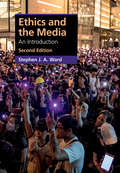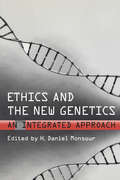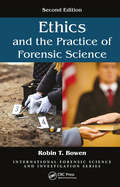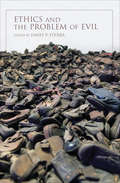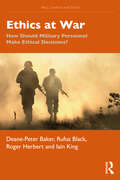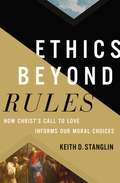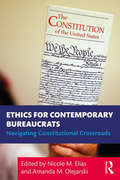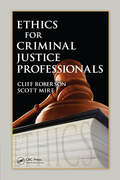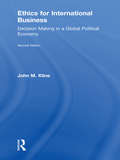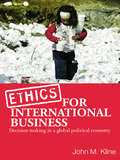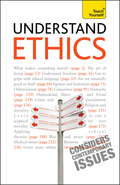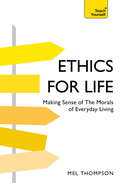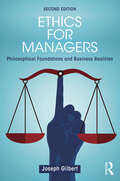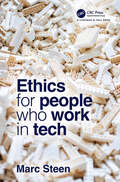- Table View
- List View
Ethics and the Laws of War: The Moral Justification of Legal Norms (Contemporary Security Studies)
by Antony LambThis book is an examination of the permissions, prohibitions and obligations found in just war theory, and the moral grounds for laws concerning war. Pronouncing an action or course of actions to be prohibited, permitted or obligatory by just war theory does not thereby establish the moral grounds of that prohibition, permission or obligation; nor does such a pronouncement have sufficient persuasive force to govern actions in the public arena. So what are the moral grounds of laws concerning war, and what ought these laws to be? Adopting the distinction between jus ad bellum and jus in bello, the author argues that rules governing conduct in war can be morally grounded in a form of rule-consequentialism of negative duties. Looking towards the public rules, the book argues for a new interpretation of existing laws, and in some cases the implementation of completely new laws. These include recognising rights of encompassing groups to necessary self-defence; recognising a duty to rescue; and considering all persons neither in uniform nor bearing arms as civilians and therefore fully immune from attack, thus ruling out ‘targeted’ or ‘named’ killings. This book will be of much interest to students of just war theory, ethics of war, international law, peace and conflict studies, and Security Studies/IR in general.
Ethics and the Limits of Philosophy
by Bernard WilliamsIn this book Bernard Williams delivers a sustained indictment of moral theory from Kant onward. His goal is nothing less than to reorient ethics toward the individual. He deals with the most thorny questions in contemporary philosophy and offers new ideas about issues such as relativism, objectivity, and the possibility of ethical knowledge.
Ethics and the Limits of Philosophy (Routledge Classics Ser.)
by Bernard WilliamsBy the time of his death in 2003, Bernard Williams was one of the greatest philosophers of his generation. Ethics and the Limits of Philosophy is not only widely acknowledged to be his most important book, but also hailed a contemporary classic of moral philosophy. Presenting a sustained critique of moral theory from Kant onwards, Williams reorients ethical theory towards ‘truth, truthfulness and the meaning of an individual life’. He explores and reflects upon the most difficult problems in contemporary philosophy and identifies new ideas about central issues such as relativism, objectivity and the possibility of ethical knowledge. This edition also includes a new commentary on the text by A.W.Moore and a foreword by Jonathan Lear.
Ethics and the Media: An Introduction (Cambridge Applied Ethics)
by Stephen J. WardNow revised and containing several new chapters, this book provides a comprehensive set of ethical principles and methods of reasoning for a new era of digital, global media. It describes the turbulent state of media ethics in ordinary language and through clear examples, and provides a pragmatic theory of truth and objectivity for engaged media. Concrete guidelines are articulated for identifying fake news and for reporting responsibly on social media racism, extreme groups, and anti-democratic demagogues, showing how citizens and journalists can work together to detox a polluted public sphere. The book examines global media ethics, where norms guide the reporting of global issues such as climate change and immigration, and considers what constitutes responsible journalism. It will be valuable for both students and practitioners of journalism and media ethics, and can also be used as a citizen's guide for evaluating media reports.
Ethics and the New Genetics: An Integrated Approach (Lonergan Studies)
by H. Daniel MonsourEveryday, new advances are being made in the science of human genetics. Accompanying progress in this area, however, are new ethical dilemmas. At a think tank sponsored by the Canadian Catholic Bioethics Institute, an interdisciplinary group of ethicists, geneticists, physicians, lawyers, and theologians gathered in an attempt to apply some features of Bernard Lonergan's notion of functional specialization to ethical debates surrounding genetics. Editor H. Daniel Monsour has brought together a series of articles presented at this think tank. The articles accomplish two tasks: first, they explore some of the advances in human genetic that continue to prompt ethical debate and outline the different stances on those issues; second, they examine those stances in the context of Roman Catholic moral and religious thought. Timely, innovative, and wide-ranging, this collection will be of interest to bioethicists and philosophers, as well as religious and Lonerganian scholars.
Ethics and the Practice of Forensic Science (International Forensic Science and Investigation)
by Robin T. BowenWhile one would hope that forensic scientists, investigators, and experts are intrinsically ethical by nature, the reality is that these individuals have morality as varied as the general population. These professionals confront ethical dilemmas every day, some with clear-cut protocols and others that frequently have no definitive answers. Since the publication of the first edition of Ethics and the Practice of Forensic Science, the field of forensic science has continued to see its share of controversy. This runs the gamut of news stories from investigators, lab personnel, or even lab directors falsifying results, committing perjury, admitting to fraud, to overturned convictions, questions about bias, ethics, and what constitutes an "expert" on the witness stand. This fully updated edition tackles all these issues—including some specific instances and cases of unethical behavior—and addresses such salient issues as accreditation requirements, standardization of ethical codes, examiner certification, and standards for education and training. The new edition provides: A new chapter on the "Ferguson Effect" faced by the criminal justice system The context of forensic science ethics in relation to general scientific ethics, measurement uncertainty, and ethics in criminal justice Ethical conundrums and real-world examples that forensic scientists confront every day The ethics and conduct codes of 20 different forensic and scientific professional organizations An outline of the National Academies of Science (NAS) recommendations and progress made on ethics in forensic science since the release of the NAS report Ethics and the Practice of Forensic Science, Second Edition explores the range of ethical issues facing those who work in the forensic sciences—highlights the complicated nature of ethics and decision-making at the crime scene, in the lab, and in the courts. The book serves both as an essential resource for laboratories to train their employees and as an invaluable textbook for the growing number of courses on ethics in criminal justice and forensic science curricula. Accompanying PowerPoint® slides and an Instructor’s Manual with Test Bank are available to professors upon qualifying course adoption.
Ethics and the Practice of Forensic Science (International Forensic Science and Investigation)
by Robin T. BowenIntegrity and honesty are the hallmarks of science - and especially so in the case of forensic science - making the study and practice of ethics essential to the field. Ethics and the Practice of Forensic Science, Third Edition directly addresses common stressors that can induce, or lead professionals - working in forensic laboratories, law enforcement, the judicial system, and at crime scenes - to commit misconduct.While forensic scientists, investigators, and experts are intrinsically ethical by nature, the reality is that these individuals face challenges including departmental or political pressures, lack of training, and conflicting standards. The difference, however, is that the work done by forensic professionals has the ability to compromise another person’s freedom, potentially leading to arrest, incarceration, and miscarriages of justice. Police and forensic professionals confront ethical dilemmas every day, some situations that fall within clear protocols or standards and others that frequently have no definitive answers.Ethics and the Practice of Forensic Science, Third Edition includes updated information and case studies, as well as recent research findings focused on ethics in forensic science. Chapters examine investigation and police culture through the lens of professional challenges, incorporating important information about the history of wrongful convictions, and including recent developments in overturned wrongful convictions, and the work of various innocence projects. Throughout the book, case examples of bias, ethical violations, and instances of tampering with evidence present the dangers of compromising one’s ethical standards. Through such cases, the book sheds light on the problem and offers alternative courses of action - presenting examples of what to do, and what not to do, when faced with ethical decisions in gathering, handling, analyzing, and presenting evidence.
Ethics and the Problem of Evil (Indiana Series in the Philosophy of Religion)
by John Hare Laura Garcia Stephen Maitzen Bruce Russell Marilyn McCord Adams Linda Zagzebski Stephen J. WykstraProvocative essays that seek &“to turn the attention of analytic philosophy of religion on the problem of evil . . . towards advances in ethical theory&” (Reading Religion). The contributors to this book—Marilyn McCord Adams, John Hare, Linda Zagzebski, Laura Garcia, Bruce Russell, Stephen Wykstra, and Stephen Maitzen—attended two University of Notre Dame conferences in which they addressed the thesis that there are yet untapped resources in ethical theory for affecting a more adequate solution to the problem of evil. The problem of evil has been an extremely active area of study in the philosophy of religion for many years. Until now, most sources have focused on logical, metaphysical, and epistemological issues, leaving moral questions as open territory. With the resources of ethical theory firmly in hand, this volume provides lively insight into this ageless philosophical issue. &“These essays—and others—will be of primary interest to scholars working in analytic philosophy of religion from a self-consciously Christian standpoint, but its audience is not limited to such persons. The book offers illustrative examples of how scholars in philosophy of religion understand their aims and how they go about making their arguments . . . hopefully more work will follow this volume&’s lead.&”—Reading Religion &“Recommended.&”—Choice
Ethics and the Quest for Wisdom
by Robert KaneModernity has challenged the ancient ideal of a universal quest for wisdom, and today's world of conflicting cultures and values has raised further doubts regarding the possibility of objective ethical standards. Robert Kane refocuses the debate on the philosophical quest for wisdom, and argues that ethical principles about right action and the good life can be seen to emerge from that very quest itself. His book contends that the search for wisdom involves a persistent striving to overcome narrowness of vision that comes from the inevitable limitations of finite points of view. When applied to questions of value and the good life, this striving has ethical implications about the way we should treat ourselves and others. This study argues for the merits of this central thesis against alternative theories in contemporary normative ethics, and discusses its practical applications for social ethics, political philosophy, law and moral education.
Ethics as a Work of Charity: Thomas Aquinas and Pagan Virtue
by David DecosimoMost of us wonder how to make sense of the apparent moral excellences or virtues of those who have different visions of the good life or different religious commitments than our own. Rather than flattening or ignoring the deep difference between various visions of the good life, as is so often done, this book turns to the medieval Christian theologian Thomas Aquinas to find a better way. Thomas, it argues, shows us how to welcome the outsider and her virtue as an expression rather than a betrayal of one's own distinctive vision. It shows how Thomas, driven by a Christian commitment to charity and especially informed by Augustine, synthesized Augustinian and Aristotelian elements to construct an ethics that does justice#151;in love#151;to insiders and outsiders alike. Decosimo offers the first analysis of Thomas on pagan virtue and a reinterpretation of Thomas's ethics while providing a model for our own efforts to articulate a truthful hospitality and do ethics in our pluralist, globalized world.
Ethics at War: How Should Military Personnel Make Ethical Decisions? (War, Conflict and Ethics)
by Deane-Peter Baker Rufus Edward Black Roger Gordon Herbert Iain Benjamin KingThis book debates competing approaches to ethical decision-making for members of the armed forces of liberal democratic states. In this volume, four prominent thinkers propose and debate competing approaches to ethical decision-making for military personnel. Deane-Peter Baker presents and expounds the ‘Ethical Triangulation’ model, an ethical decision-making method he has employed through much of his career as an applied military ethicist. Rufus Black advocates for a natural law-based approach, one which has heavily influenced the framework formally adopted by the Australian Defence Force. Roger Herbert outlines the ‘Moral Deliberation Roadmap’, the moral reasoning framework recently adopted by the US Naval Academy. Iain King then sets out a model of quasi-utilitarian decision-making developed in several post-conflict settings and refined at the UK’s Royal College of Defence Studies. After the opening chapters in which each author outlines their favoured decision-making approach, the four contributors then evaluate each other’s proposals, often critically. Philosopher David Whetham offers some concluding thoughts in which he summarizes areas of agreement between the authors, identifies key areas of difference, and suggests directions for future research. This book will be of great interest to students of military ethics, the ethics of war, moral philosophy, and International Relations, as well as military professionals.
Ethics at the Center: Jewish Theory and Practice for Living a Moral Life (A JPS Scholar of Distinction Book)
by Rabbi Elliot N. DorffEthics at the Center culls the best of Rabbi Elliot N. Dorff&’s pioneering thinking in Jewish ethics over nearly five decades. Dorff shows that our response to moral issues depends ultimately on our conceptions of the nature of human beings and God; how Jewish law, theology, prayer, history, and community should also define and motivate Jewish responses to moral issues; and how the honorable and divergent stances of Western philosophy and other religions about moral living shed light on Judaism&’s distinctive standpoints. From there Dorff applies Judaism&’s ethics to real life: abortion post–Roe v. Wade, sexual orientation and human dignity, avoiding harm in communication, playing violent or defamatory video games, modern war ethics, handling donations of ill-gotten gain after the fact. In conclusion he explores how Jewish family and community, holidays and rituals, theology, study, and law have moral import as well. Dorff&’s personal introduction to each chapter reflects on why and when he wrote its contents, its continuing relevance, and if—and if so, how—he would now change what he wrote earlier. Readers will experience not only his evolving ethical thought but many facets of the person and the Jew that Dorff is today.
Ethics at the End of Life: New Issues and Arguments
by John DavisThe 14 chapters in Ethics at the End of Life: New Issues and Arguments, all published here for the first time, focus on recent thinking in this important area, helping initiate issues and lines of argument that have not been explored previously. At the same time, a reader can use this volume to become oriented to the established questions and positions in end of life ethics, both because new questions are set in their context, and because most of the chapters—written by a team of experts—survey the field as well as add to it. Each chapter includes initial summaries, final conclusions, and a Related Topics section.
Ethics beyond Rules: How Christ’s Call to Love Informs Our Moral Choices
by Keith D StanglinAn introduction to ethics that will help Christians rediscover a moral reasoning rooted in Scripture and navigate the ethical crises of our time. How should Christians live? How should we interact with one another? Why do we think the way we do about right and wrong? How should we approach today's complex moral questions? Keith Stanglin realigns our ethical thinking around the central question: What does real love require? applying it to our ethical reasoning on many of the social issues present in today's culture:abortionsexual ethicsconsumerismtechnologyraceand politicsMoral evaluation must be based on more than our subjective feelings or the received wisdom or majority opinion of our community. But thinking objectively and reasonably about our ethical commitments is a process that's rarely taught in contemporary education or even in churches.Ethics Beyond Rules is a clear and accessible introduction for thoughtful Christians who want to lead moral lives—who want to define their moral code by firm biblical standards while acknowledging the complex nature of the issues at hand. Stanglin's love-based framework for moral decision-making engages Scripture and the historic Christian faith, giving Christians the tools to clear-mindedly consider the ethical problems of today and the foundation to confront new issues in the years to come.
Ethics for Adversaries: The Morality of Roles in Public and Professional Life
by Arthur Isak ApplbaumThe adversary professions--law, business, and government, among others--typically claim a moral permission to violate persons in ways that, if not for the professional role, would be morally wrong. Lawyers advance bad ends and deceive, business managers exploit and despoil, public officials enforce unjust laws, and doctors keep confidences that, if disclosed, would prevent harm. Ethics for Adversaries is a philosophical inquiry into arguments that are offered to defend seemingly wrongful actions performed by those who occupy what Montaigne called "necessary offices." Applbaum begins by examining the career of Charles-Henri Sanson, who is appointed executioner of Paris by Louis XVI and serves the punitive needs of the ancien régime for decades. Come the French Revolution, the King's Executioner becomes the king's executioner, and he ministers with professional detachment to each defeated political faction throughout the Terror and its aftermath. By exploring one extraordinary role and the arguments that can be offered in its defense, Applbaum raises unsettling doubts about arguments in defense of less sanguinary professions and their practices. To justify harmful acts, adversaries appeal to arguments about the rules of the game, fair play, consent, the social construction of actions and actors, good outcomes in equilibrium, and the legitimate authority of institutions. Applbaum concludes that these arguments are weaker than supposed and do not morally justify much of the violation that professionals and public officials inflict. Institutions and the roles they create ordinarily cannot mint moral permissions to do what otherwise would be morally prohibited.
Ethics for Biomedical Engineers
by Jong Yong Foo Andrew P. Bradley Dennis Kwok-Wing Tam Stephen J. Wilson Winston GweeOver the last few decades, there are increasing public awareness of adverse events involving engineering failures that not only led to monetary losses but also more importantly, human injuries and deaths. Whilst it is vital for an engineering professional or student to acquire the necessary technical knowledge and skills in their respective field, they must also understand the ethical essences that are relevant to their profession. Engineering professionals like biomedical engineers, need to appreciate the fundamentals of best practices and recognise how any derivation from such practices can have undesirable impacts on human lives. Through this book, it is hoped that readers would draw the relevance between the study of ethics and biomedical engineering. The book would be a useful source and reference for college-level and university-level students. Moreover, the contents are written so as to also provide valuable insights even for existing biomedical engineers and those enrolled in continual engineering education programs.
Ethics for Contemporary Bureaucrats: Navigating Constitutional Crossroads
by Nicole M. Elias Amanda M. OlejarskiIn the current United States (U.S.) context, we are facing a constitutional crisis with frequent government shutdowns and new debates surrounding immigration, climate change, budgeting practices, and the balance of power. With competing interests, unclear policy, and inconsistent leadership directives, the question becomes: How do contemporary bureaucrats make sense of this ethically turbulent environment? This collection provides a lens for viewing administrative decision-making and behavior from a constitutional basis, as contemporary bureaucrats navigate uncharted territory. Ethics for Contemporary Bureaucrats is organized around three constitutional values: freedom, property, and social equity. These themes are based on emerging trends in public administration and balanced with traditional ethical models. Each chapter provides an overview of a contemporary ethical issue, identifies key actors, institutions, legal and legislative policy, and offers normative and practical recommendations to address the challenges the issue poses. Rooted in a respected and time-tested intellectual history, this volume speaks to bureaucrats in a modern era of governance. It is ideally suited to educate students, scholars, and public servants on constitutional values and legal precedent as a basis for ethics in the public sector.
Ethics for Criminal Justice Professionals
by Cliff Roberson Scott MireIncreasing concerns about the accountability of criminal justice professionals at all levels has placed a heightened focus on the behavior of those who work in the system. Judges, attorneys, police, and prison employees are all under increased scrutiny from the public and the media. Ethics for Criminal Justice Professionals examines the myriad of e
Ethics for International Business: Decision-Making in a Global Political Economy
by John KlineBusiness takes place in an increasingly global environment, crossing political and cultural boundaries that challenge corporate values. The central focus of this successful and innovative text lies in how to make and explain 'best choice' judgments when confronting ethical dilemmas in international business situations.The newly-updated version of this groundbreaking textbook continues to provide a topical and relevant analysis of the ethical dimensions of conducting business in a global political economy. From a starting point of applied ethics, the book introduces a common set of normative terms and analytical tools for examining and discussing real case scenarios. Extensive real-world examples, presented in the form of exhibits, cover issues including: foreign production, including sweatshops export of hazardous products testing and pricing of HIV-AIDS drugs advertising tobacco, alcoholic beverages and infant formula deceptive marketing techniques and bribery religious and social discrimination cultural impacts from 'music, movies and malls' environmental issues, including oil spills, rain forest preservation, global warming and genetically modified foods fair trade certification and consumer boycotts oil investments in the Sudan, Burma and Nigeria. To keep pace with the changing landscape of global business, this new edition features: updated exhibits that introduce new issues, including internet censorship and privacy, marketing and obesity, dumping electronic waste in Ghana, the costs of bottled water, and Wal-Mart’s supplier code in China increased coverage of issues arising in emerging markets updated descriptions and assessments of relevant international agreements seventeen new photographs that were chosen to accompany cases designed for classroom discussion "framing questions" to guide discussion of issues in topical chapters three additional figures that help depict the ethical analysis process. The continued globalization of business increases the relevance of this textbook and its unique focus on specifically international ethical challenges faced by business, where governments and civil society groups play an active role. While most business ethics texts continue to focus heavily on ethical theory, this textbook condenses ethical theory into applied decision-making concepts, emphasizing practical applications to real world dilemmas.Anyone with an interest in the ethical implications of international business, or the business implications of corporate responsibility in the global market, will find this book a thought-provoking yet balanced analysis. Clearly written, this has become the textbook of choice in this increasingly important field.
Ethics for International Business: Decision-Making in a Global Political Economy
by John M. KlineFirst published in 2004. Routledge is an imprint of Taylor & Francis, an informa company.
Ethics for Life (6th Edition)
by Judith A. BossA multicultural and interdisciplinary introductory ethics textbook that provides students with an ethics curriculum that has been shown to significantly improve student's ability to make real-life moral decisions.
Ethics for Life: Making Sense of the Morals of Everyday Living
by Mel ThompsonWhether you're a student studying philosophy at any level, or simply want to gain a deeper understanding of this fascinating subject, Understand Ethics is an accessible introduction to all the key theories and thinkers. Fully updated, this latest edition includes contemporary examples and discussion of current debates including terrorism, genetics and the media, helping you to grasp how ethics applies to life today.NOT GOT MUCH TIME?One, five and ten-minute introductions to key principles to get you started.AUTHOR INSIGHTSLots of instant help with common problems and quick tips for success, based on the author's many years of experience.TEST YOURSELFTests in the book and online to keep track of your progress.EXTEND YOUR KNOWLEDGEExtra online articles at www.teachyourself.com to give you a richer understanding of psychology.FIVE THINGS TO REMEMBERQuick refreshers to help you remember the key facts.TRY THISInnovative exercises illustrate what you've learnt and how to use it.
Ethics for Life: Making Sense of the Morals of Everyday Living (Teach Yourself General)
by Mel ThompsonWe all face questions on an almost daily basis related to truth and post-truth, particularly in the political sphere, terrorism, globalization, immigration and asylum, social responsibility, media and social-media ethics, and gender and LGBT issues. So how do you navigate this minefield? Ethics for Life is an accessible introduction to all the key theories and thinkers. It shows the relevance of ethical ideas and theories to everyday life, emphasizing the way our view of ourselves and the societies we live in is shaped by our moral values and the arguments they are based on.With contemporary examples and discussion of current debates including terrorism, genetics and the media, Ethics for Life will help you grasp how ethics applies to life today.
Ethics for Managers: Philosophical Foundations and Business Realities
by Joseph GilbertEthics for Managers introduces students to the philosophical underpinnings of business ethics and translates this theory into practical terms, demonstrating the moral implications of the decisions managers make. This edition features new material on global ethics, the financial downturn, and ethical sustainability. New, student-friendly features include: Learning objectives at the beginning of each chapter, which provide a roadmap to what is covered and how to use it. Cases that demonstrate real-world scenarios, allowing readers to grapple with real moral ambiguity. Discussion questions at the end of each chapter, which challenge students to see different moral perspectives and to practice good decision-making. A new chapter on international business ethics. Students of business ethics courses will find this compact, well-organized text a useful tool to understand ethics in the digital age.
Ethics for People Who Work in Tech
by Marc SteenThis book is for people who work in the tech industry—computer and data scientists, software developers and engineers, designers, and people in business, marketing or management roles. It is also for people who are involved in the procurement and deployment of advanced applications, algorithms, and AI systems, and in policy making. Together, they create the digital products, services, and systems that shape our societies and daily lives. The book’s aim is to empower people to take responsibility, to ‘upgrade’ their skills for ethical reflection, inquiry, and deliberation. It introduces ethics in an accessible manner with practical examples, outlines of different ethical traditions, and practice-oriented methods. Additional online resources are available at: ethicsforpeoplewhoworkintech.com.



